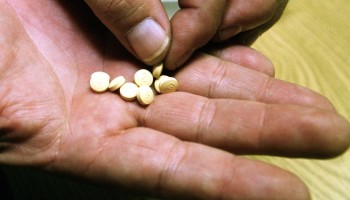Iraqi security forces intercepted an attempt to smuggle Captagon pills from Syria into Iraq, seizing 30,000 tablets, the government announced.
The smuggling attempt was thwarted near the Al-Baghuz area along the Iraq-Syria border, Interior Ministry spokesman General Moqdad Miri said. The smuggling operation was stopped when thermal cameras at the border detected the camouflaged drugs, he explained.
The pills were hidden in plastic containers wrapped in bags and placed inside bundles of reeds to avoid detection, Miri said.
Iraqi authorities said “necessary legal measures were taken,” but did not disclose whether any arrests were made in connection with the smuggling attempt.
The latest operation comes a few weeks after Iraqi forces intercepted one of the largest shipments of the illegal drug, seizing 1.1 tons of Captagon coming from Syria via Turkey.
Captagon is the brand name for fenethylline, a stimulant developed in West Germany in the 1960s to treat attention deficit disorder, narcolepsy, and depression. Banned in most countries in 1986, counterfeit Captagon pills became popular as a recreational drug in the Middle East, particularly in Gulf states such as Saudi Arabia, the UAE, and Qatar—as well as among fighters in Syria’s civil war.
Today, the illicit pills often deviate from the original formula and may contain substances such as caffeine, the asthma drug theophylline, or paracetamol.
Iraq has become a major hub for drug trafficking, with authorities seizing a record amount of Captagon in 2023 alone, worth up to $144 million, according to a United Nations report published in 2024.
Recent Captagon busts show that the Captagon industry, which became Syria's largest export during the country's civil war under the regime of Bashar al-Assad, continues to flow despite al-Assad's ouster.
“Syria has become the world's largest producer of Captagon,” Syrian rebel leader Ahmed al-Sharaa, now Syria's interim president, said on the day Assad's regime fell, vowing that the country would be “cleansed” of the drug.
Merely one month after the fall of Assad regime, Syrian security forces destroyed hundreds of millions of Captagon pills, the raw materials used to make the drug, and nearly 15 tons of hashish.
Despite the new Syrian administration's efforts to crack down on Captagon, production and smuggling operations in the country are still well underway, as evident by the recent busts.
The problem does not end with the seizure and destruction of the drug in such large quantities, but with the actual manufacturing and production, which the government has reportedly not investigated so far, Roaa Obaid, head of the Captagon seizure database at the Drug Trafficking Tracking Department of the Newlines Institute, told U.S.-based Arabic-language channel, Alhurra.
“As long as these individuals remain free, they could continue producing Captagon pills using new methods and smuggling techniques,” Obaid said.
As for Iraq, its challenges extend beyond cracking down on Captagon flows from Syria. The country is also grappling with Captagon smuggling on its opposite border, where raw materials for the drug are reportedly sourced from Iran and shipped to local labs in Iraq or to other countries for production, to be later transported to the Gulf states, Iraqi anti-drug activist Mohammed al-Yasiri told Alhurra.






